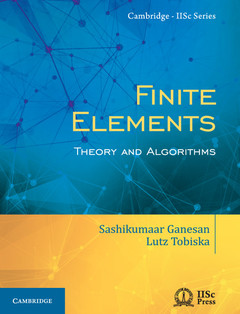Finite Elements Theory and Algorithms Cambridge IISc Series
Langue : Anglais
Auteurs : Ganesan Sashikumaar, Tobiska Lutz

Written in easy to understand language, this self-explanatory guide introduces the fundamentals of finite element methods and its application to differential equations. Beginning with a brief introduction to Sobolev spaces and elliptic scalar problems, the text progresses through an explanation of finite element spaces and estimates for the interpolation error. The concepts of finite element methods for parabolic scalar parabolic problems, object-oriented finite element algorithms, efficient implementation techniques, and high dimensional parabolic problems are presented in different chapters. Recent advances in finite element methods, including non-conforming finite elements for boundary value problems of higher order and approaches for solving differential equations in high dimensional domains are explained for the benefit of the reader. Numerous solved examples and mathematical theorems are interspersed throughout the text for enhanced learning.
Preface; 1. Sobolev spaces; 1.1. Banach and Hilbert spaces; 1.2. Weak derivatives; 1.3. Sobolev spaces; 2. Elliptic scalar problems; 2.1. A general elliptic problem of second order; 2.2. Weak solution; 2.3. Standard Galerkin method; 2.4. Abstract error estimate; 3. Finite element spaces; 3.1. Simplices and barycentric coordinates; 3.2. Simplicial finite elements and local spaces; 3.3. Construction of finite elements spaces; 3.4. The concept of mapped finite elements: affine mappings; 3.5. Finite elements on rectangular and brick meshes; 3.6. Mapped finite elements: general bijective mappings; 3.7. Mapped Qk finite elements; 3.8. Isoparametric finite elements; 3.9. Further examples of finite elements in C0 and C1; 4. Interpolation and discretization error; 4.1. Transformation formulas; 4.2. Affine equivalent finite elements; 4.3. Canonical interpolation; 4.4. Local and global interpolation error; 4.5. Improved L2 error estimates by duality; 4.6. Interpolation of less smooth functions; 5. Biharmonic equation; 5.1. Deflection of a thin clamped plate; 5.2. Weak formulation of the biharmonic equation; 5.3. Conforming finite element methods; 5.4. Nonconforming finite element methods; 6. Parabolic problems; 6.1. Conservation of energy; 6.2. A general parabolic problem of initial boundary value problems; 6.3. Weak formulation of initial boundary value problems; 6.4. Semidiscretization by finite elements; 6.5. Time discretization; 6.6. Finite elements for high-dimensional parabolic problems; 7. Systems in solid mechanics; 7.1. Linear elasticity; 7.2. Mindlin–Reissner plate; 8. Systems in fluid mechanics; 8.1. Conservation of mass and momentum; 8.2. Weak formulation of the Stokes problem; 8.3. Conforming discretizations of the Stokes problem; 8.4. Nonconforming discretizations of the Stokes problem; 8.5. The nonconforming Crouzeix–Raviart element; 8.6. Further inf–sup stable finite element pairs; 8.7. Equal order stabilized finite elements; 8.8. Navier–Stokes problem with mixed boundary conditions; 8.9. Time discretization and linearization of the Navier–Stokes problem; 9. Implementation of the finite element method; 9.1. Mesh handling and data structure; 9.2. Numerical integration; 9.3. Sparse matrix storage; 9.4. Assembling of system matrices and load vectors; 9.5. Inclusion of boundary conditions; 9.6. Solution of the algebraic systems; 9.7. Object-oriented C++ programming; Bibliography; Index.
Sashikumaar Ganesan obtained his Ph.D. from Otto-von-Guericke-Universität Magdeburg, Germany 2006. He was Postdoctoral Fellow at Otto-von-Guericke-Universität Magdeburg, Germany (2006–08) and Research Associate (2008–09) at the Imperial College of Science, Technology and Medicine, London. He joined the Indian Institute of Science (IISc), Bangalore as Assistant Professor in 2011. He is currently heading a research group on Numerical Mathematics and Scientific Computing at Supercomputer Education and Research Centre, IISc, Bangalore. His areas of interest include numerical analysis, finite elements in fluid dynamics and high performance computing.
Lutz Tobiska is Professor at the Institute for Analysis and Computational Mathematics, Otto-von-Guericke-Universität Magdeburg, Germany. He received his Ph.D. from the Technische Hochschule Magdeburg in 1977. He has published many articles in international journals. His areas of interest include finite elements in fluid dynamics, parallel algorithms, multigrid methods and adaptive methods for convection diffusion equations.
Lutz Tobiska is Professor at the Institute for Analysis and Computational Mathematics, Otto-von-Guericke-Universität Magdeburg, Germany. He received his Ph.D. from the Technische Hochschule Magdeburg in 1977. He has published many articles in international journals. His areas of interest include finite elements in fluid dynamics, parallel algorithms, multigrid methods and adaptive methods for convection diffusion equations.
Date de parution : 05-2017
Ouvrage de 216 p.
19x24.8 cm
Disponible chez l'éditeur (délai d'approvisionnement : 14 jours).
Prix indicatif 72,61 €
Ajouter au panierThème de Finite Elements :
© 2024 LAVOISIER S.A.S.
